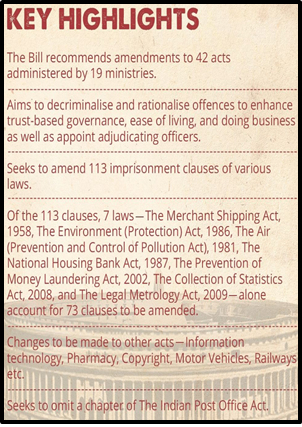GOVERNMENT PROPOSES TRUST-BASED RULES FOR INDUSTRIAL POLLUTION MONITORING
Why in the news?
The government introduced draft amendments under the Jan Vishwas Act, proposing significant changes to industrial pollution monitoring, sparking concerns over reduced regulatory oversight.
source:prsindia.org
Government Proposals and Changes
- The Union Environment Ministry introduced draft notifications under the Jan Vishwas (Amendment of Provisions) Act, 2023, to promote trust-based governance, ease of living, and business.
- Proposed amendments to the Air Act, 1981, and Water Act, 1974, could exempt non-polluting industries from needing mandatory consent from pollution control boards.
- A new framework will introduce adjudicating officers to oversee environmental offences.
Exemptions and Self-Declarations
- Industries classified as “White” by the Central Pollution Control Board (CPCB) will be exempt from mandatory clearances and only need to self-declare their operations to state pollution control boards.
- Projects requiring prior Environmental Impact Assessment (EIA) clearance will not need additional consent to establish (CTE); this will be integrated with the Environmental Clearance (EC) process.
- State Pollution Control Boards (SPCBs) and Pollution Control Committees (PCCs) will ensure exempted units adhere to regulations.
About Jan Vishwas Act, 2023:
Key Features:
Benefits:
|




